Book Forum: Susanne Yuk Ping Choi on Intimacy as a Lens in Work and Migration

I really enjoyed Intimacy as a Lens in Work and Migration; it was a book which I couldn’t put down until I finished it in one go. My own research addresses gender migration and work, so I approached the book from that perspective. There are clear themes of state, market and the commodification of migrant identity. For me, the part which caught my attention was the idea that ethnic performance is affective labour, producing particular affect, like labour and comfort, for consumption by paid customers. This involves emotional labour, as trying to make people happy requires managing your own emotions. It also requires aesthetic labour, being young and good looking, and therefore also sexualised labour, as aesthetic and sexualised labour are related, hence being consumed by businessmen.
Jingyu Mao valuably reveals the structural aspects shaping the living and working conditions of the performers. There are structural aspects, as there are state-created mobility systems, such as the Hukou system, where the state engineers groups with minority ethnicities. The government constructs ethnic minorities as the nation’s happiness provider, giving big and warm smiles to make everyone feel welcome. Further, it isn’t just the national government, but local governments who capitalise on the ethnic scripts. Ethnic minorities produce the happiness economy consumed by tourists, with markets and restaurants capitalising on this imagery of happiness and exploiting ethnic minority labour in the sale of exotic experiences.
Fascinatingly, Jingyu Mao reveals links not only between the structural and personal, but also the interpersonal, via the concept of emotional regime – referring to the institutional regulation of emotional expressions. In these settings, where ethnic minorities are expected to carry out the duty of happiness, they can’t express other, negative emotions because in the more politicised contexts, the negative emotions can have grave political consequences. The Chinese government wants to have a good Chinese story, and the ethnic minorities have the duty to tell this national story. This presents a neoliberal regulation of their emotion as happiness is individual at the producer and consumer level – the businessmen, the tourists and the ethnic minorities themselves all seek to achieve happiness.
As an ethnographer, Jingyu Mao discloses what is behind the scenes by detailing the exploitative working conditions of these ethnic performers: long working hours, and as well as serving as waitresses, they’re expected to be immediately on call for singing and dancing performances. As migrants, they are second-class citizens. The story of the 17-year-old girl who falls sick, with her parents needing to take her home as she couldn’t afford the medical bills in the city where she was working, reveals how social structures shape individual lives.
I would have been interested to learn more about the aspirations of these workers and how these aspirations shape the lines of action that they take. I understand these are workers without much bargaining power, but I also know that sometimes resistance occurs in unexpected places. This is important, otherwise it won’t be known where change may happen. And, as Jingyu Mao says, emotion comes into it. Emotion is very important for migration scholarship, which is still dominated by push-pull factors and economic explanations. For instance, in the UK, when we look at child migrants coming from France and how the Prime Minister seeks to respond to this, the emotional aspects of why people are risking their lives to cross the Channel are never tackled, with push-pull factors assumed.
I would also have liked to know more about the small number of Han ethnic majority performers, which Jingu Mao mentions as a feature of this system. How do they navigate this employment? Do they perform as ethnic minorities to get along with ethnic minorities? If so, what kinds of tensions might that produce, for both the Han and minority performers?
Though this is an academic book, it is very accessible with a lot of auto-ethnographic reflection. Jingyu Mao talks about rumours and perceived differences, then about how she navigated that system when others thought she was an outsider but also an insider. When students are engaging with qualitative research, we try to help them understand how the researcher’s personality comes into the research and makes sense of the data. This book offers an impeccable example of a researcher using their personality to analyse data.
Author Bio:
Prof. Susanne Yuk Ping Choi is a Professor of Sociology and Co-Director of the Gender Research Centre at the Chinese University of Hong Kong. Her research interests include migration, gender, family and sexuality in Chinese and Asian societies.